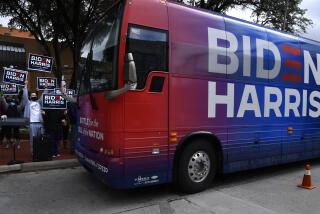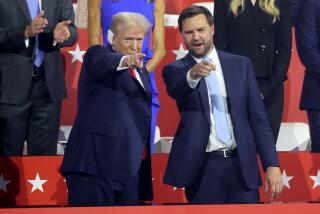The View From Inside the Campaign Bus
- Share via
As the people watched the reporters walk to the campaign bus, I could see they thought we journalists were an odd lot.
I was hanging back, sitting on a bench, my two days with Gov. Bill Clinton’s presidential campaign over. Soon, I’d be on a United Airlines plane heading home while the other reporters continued on the long campaign trail that winds through the late summer and fall to Election Day.
“They follow him everywhere,” a young woman told her parents, apparently puzzled that grown men and women would earn a living in such a peculiar way.
That’s how I used to earn my living. I covered every presidential and gubernatorial campaign for 16 years, part of a pack of campaign reporters who rode buses and airplanes with candidates, following them, as the young woman noted, everywhere.
Although those days are past, I still am trying to sort out in my mind the peculiar role in the political process played by the campaign reporters. You think about it, too, judging from the questions I get when speaking to groups around town. So while the press is taking a televised bashing from GOP leaders at the Republican National Convention, I thought I’d help you out by explaining a little bit about the journalists who provide the daily news about the candidates.
I first saw traveling political reporters in 1962. They swung off the bus in front of the Capitol in Sacramento as though they were special people, portable typewriters at their sides. They seemed so glamorous, so free from the routine cares of the working day that I knew I had to become one of them.
When I made it to the bus, I saw the mixed blessings of the work.
As I had hoped, the old routine vanished. Gone was the hour-by-hour supervision by office bosses. So were the duties of home, handed over to a wife who had sole responsibility for our two daughters during my long absences. You can guess the strain that placed on family relationships.
The constant movement while trailing candidates put me out of touch with the country as well as with my family. We lived in hotels and ate in restaurants, supported by expense accounts. We hung out together, or with campaign aides who shared our addiction to politics.
In the fall of 1976, I dropped off the bus in Youngstown, Ohio, for a few days to do a story about steelworkers facing unemployment. I got friendly with one of the workers, who brought me home to meet his family. They wanted to know if I had a family. Do you have a house? Do you have kids? Well, then how can you travel all the time? They saw me as sort of a likeable oddball but I don’t think they would have selected me to describe to the world the state of America in that election year.
You’ll hear a lot of talk from the Republican convention about how the press loves Gov. Clinton and has it in for President Bush.
It doesn’t work that way. On the contrary, my wife said I liked everyone I covered, Republican or Democrat. I think she was being unfair. But I tried to understand the candidates, dutifully recording the drivel put out by the campaign team, the only source of news on the fast-moving caravan. Listening to it over several weeks left me like a racehorse running with blinders, only able to look straight ahead.
One day, I almost missed the bus. I ran like mad for a short distance and climbed aboard as the bus was leaving. A campaign volunteer looked at my red face and heaving chest. “You got emphysema?” he said. “No,” I answered. Nothing wrong with me. But I figured maybe it was time to quit smoking and go into another form of reporting.
When I got on the Clinton campaign bus in Santa Monica last Friday morning, I was curious to see how much life on the road had changed.
Laptop computers, of course, had replaced portable typewriters many years ago. Cellular phones and beepers put the traveling reporters in instant contact with their bosses. Freedom, the quality which had attracted me to the life, was gone.
Even on two slow days, the campaign moved so fast the reporters wondered where they were. All the news came from Clinton and his aides. I felt just as out of touch as when I was a regular campaign reporter.
When I got off in Pittsburg, just east of San Francisco Bay, a spectator spotted me wearing the tangle of security badges that separate reporters from ordinary people. “Can I ask you something?” he said. “Why did the reporters block our view during the speech?”
“They didn’t mean to,” I said. “They’re under a lot of pressure. They’re working people, like you.”
I think he, too, felt we have an odd way of making a living. I hope he understood that most reporters are well-intentioned. It’s just that sometimes we block the view.
More to Read
Get the L.A. Times Politics newsletter
Deeply reported insights into legislation, politics and policy from Sacramento, Washington and beyond. In your inbox twice per week.
You may occasionally receive promotional content from the Los Angeles Times.










